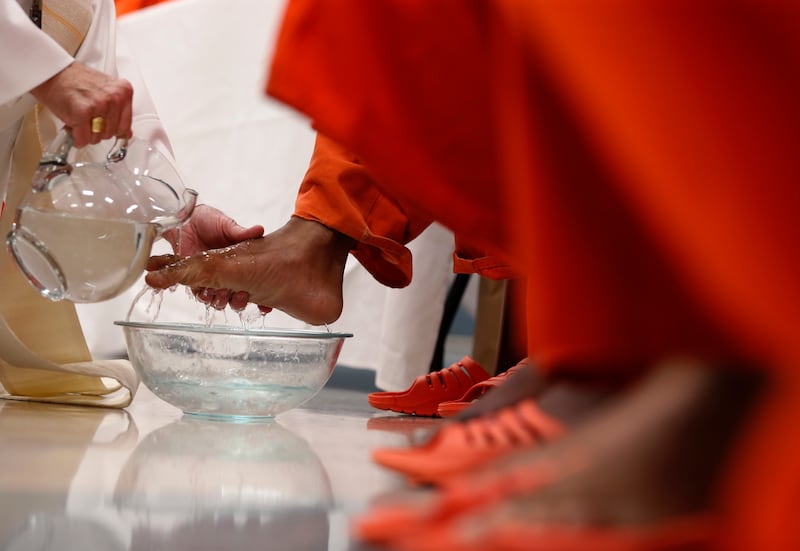In many churches on Thursday, Christians will ponder Jesus’ final meal with his disciples before his crucifixion. The Last Supper, as it is known, was a Passover celebration, remembering how God’s ancient Jewish people celebrated his faithful love in saving them from slavery in Egypt.
In the English-speaking world, this day is called Maundy Thursday. It comes from the Latin Mandatum novum do vobis, words Jesus spoke to his apostles: “A new mandate I give to you” — the command to love and serve one another.
On Passover night, the climax of the celebration usually revolves around an empty seat and the untouched cup of Elijah. At the Last Supper, though, there was a new action. Jesus took that cup and proclaimed it his blood. He then took off his robe — the one that will later be gambled over by those crucifying him — and knelt before his apostles. He then humbly washed their feet.
This extraordinary gesture will be reenacted throughout the world Thursday in sacraments and liturgies in Orthodox, Catholic, Anglican, Lutheran and some Protestant churches. The pope even washes vagrants’ feet on the streets of Rome. (He recently communicated the dignity of divine nature in all God’s children by washing the feet of a young Muslim in a women’s prison.) Loving service is sacramental, part of the wonderfully unfurling drama of the redemption and exultation of all the Lord’s children.
When I arrived in Provo, Utah, last year for a time of ministry, I was looking forward to walking around stunning places, such as the Alpine Loop and Bridal Veil Falls of the Wasatch Front, and even more dramatic monuments in southern Utah. What a great prospect that was. The mountains looked wonderful, but my feet — though intent upon traveling with the gospel of peace — soon became anything but beautiful.
On the last Sunday of August, the tiles on an apartment patio released their heat into my soles as I put an avocado pear outside to ripen in the sunshine. By that evening, I knew that serious intervention was needed, though I underestimated how long healing would take. In fact, it is still going on, having required amputation of two of my toes.
Although those moments devastated many arrangements, my condition also prompted a torrent of loving service. Wounded feet really were a blessing — from the countless people I still remember with thanksgiving in the University of Utah Burn Center in Salt Lake City, to people from Utah showing kindness, grace and profound hospitality.
It was as if scarred feet were really beautiful.
Through the kindness and fellowship of so many around Utah and the world, I felt the footsteps and blessing of the Lord alongside me. His hallmarks are wounded hands and feet. Yet there is no step any of us can take, no matter how perilous or painful, that our Lord does not know.
Every speck of blood, each wound however small or large, bears witness to the Lord’s solidarity with every wounded soul throughout all time. And it reminds us of his mandates — “tend each others’ wounds” and “wash one another’s feet.” The Utahns of Zion certainly did that; I was healed by being humbled every day by their grace.
For example, Carrie Brown was the home-care nurse who each day drove from nearby American Fork to Provo to change, dress and care for my burned feet until I was well enough to fly home. I didn’t tell her — though perhaps now she will find out — that I began to be aware that she was a sacramental presence; the Lord was washing my feet through her care.
After recent surgery back home, an eminent surgeon cleaned and inspected my feet. I was overwhelmed by an amazing sense of blessing, at once humbling and exalting.
“Lord, dost thou wash my feet?” asked Peter in bewilderment at that Last Supper. I knew the Lord was washing my soiled, damaged and abused feet through his servant, Dr. Constantinos Loizou. I welled up with tears of gratitude and profound amazement at the uncontrollable mystery on a hospital ward.
This Easter, I long to celebrate the yearly remembrance of the Last Supper. Even if I may not be agile enough to wash other people’s feet yet, I am aware that I have a lifetime of washing feet ahead, in humble gratitude to others’ kindness to mine this year.
The Rev. Andrew Teal was a visiting scholar and affiliate faculty at the Maxwell Institute at BYU last fall. He is a chaplain fellow and lecturer in theology at Pembroke College in the University of Oxford, England, and a priest of the Church of England.


